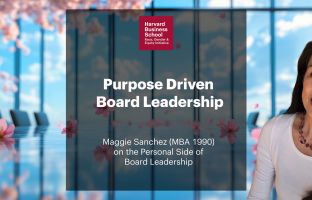HBS Alums on the Future of the Board Room (and How to Get There)
Joining a corporate board can mean making a lasting impact on companies of the future. Getting your first board seat, however, can be a challenge. The Race, Gender & Equity Initiative’s Board Diversity Network (BDN) hosted three alumni events this fall to demystify the process, particularly for women and people of color who continue to be underrepresented on corporate boards. The three events featured advice from seasoned HBS alumni on how to land a corporate board seat—including ideal skills for aspiring directors, the importance of relationships in seeking leadership opportunities, and, lastly, navigating current and future board challenges. Read on for recaps of each event.
In September, 100+ alums gathered at Alumni Reunions for a panel with BDN Steering Committee members Nisha Kumar Behringer (MBA 1995) and Kris Pederson (MBA 1991). The event offered guidance on landing a corporate board seat, what skills boards look for, and the importance of persistence.
Key practical insights included:
- Directors should have a broad range of skills and show flexibility. It’s good to bring the core financial skills but boards these days are also looking for expertise on how to navigate economic uncertainty, capital allocation, cybersecurity, digital transformation and AI, and all things talent and human capital.
- Boards are usually looking for a particular skill set (such as cybersecurity expertise or experience with CEO transitions) in a new member, but it’s still important to show broad leadership capabilities, including that you know how to build consensus and be a thoughtful, action-oriented team player.
- Persistence really matters. Be vocal with your network about your search, showcase your experience (including any nonprofit or advisory board roles), and join gatherings of current directors when you can. Conferences and talks on what it means to be an excellent board member can be useful as both educational and networking opportunities.
- Do your homework. Once you get the interview, demonstrate that you’ve done your research about the company. Preview the kinds of questions you would ask as a board member and **make it clear what specific value you would add.
In October, Pederson continued the conversation with Herman Bulls (MBA 1985) and Ann Lucena (MBA 2012) in a BDN webinar: “How to Join Your First (or Next) Board.” You can watch the recording of this webinar HERE (HBS alumni need to login to watch the video)
Reflecting on their experiences joining multiple boards, all three speakers spoke to the power of relationship building over time:
- Networking is transactional, Bulls says, whereas connecting is about engaging in a sincere relationship. If you connect in a genuine way with fellow leaders consistently, they’ll learn they can trust you. This, combined with the right expertise, leads to people thinking of you for meaningful opportunities.
- Use your networks: To join your first board, Lucena says, it is helpful to seek advice and feedback: run your resume and board bio by colleagues, mentors, and former professors, actively soliciting feedback on how you come across to others.
- The biggest pieces of advice? Become an expert on what you do, focus on real connections, and be a voracious learner.
- Resilience is essential, but seek feedback: As you go out on interviews, aim to get comfortable hearing no; rejection is a learning experience and often just part of getting to your first “yes”. But, don’t make the same mistake twice—ask what you can do better and focus on continuous improvement.
Finally, at the November HBS Women’s Leadership Summit, alumni heard a diverse group of women directors reflect on their board service and share advice from the top on the panel “Today’s Boardroom: Hot Topics in Corporate Governance and Oversight.” Behringer, Kristy Cunningham (MBA 1998), Rachel Lam (MBA 1994), and Liza Cahill Lempres (MBA 1989) shared insights on their very different board experiences and discussed how boards are approaching current challenges. A few takeaways:
- Adding value to today’s boards means driving conversations on talent and organizational structure. Directors also advise on everything from go-to-market strategies and how to ramp up growth to enterprise risk management and leveraging AI.
- Joining a startup board, either as an investor or independent director, poses unique opportunities. It’s important to know your voting rights, what block you’re in, and what formal influence you have. Notice whether you’re joining a more CEO-friendly or investor-friendly board. If you’re independent, you can act as the connective tissue between different players.
- Know what you bring to a board, but avoid limiting yourself to a narrow swim lane; your input will be needed on a breadth of topics. For example, **if you have operations expertise, use it—**having comprehensive knowledge of operations can translate to both domestic and international boards; U.S.-based companies want to know how to improve consumer insights and compete globally, while global consumer products companies seek support to navigate geopolitical complexities.
- For boards to stay effective, it’s important to have a board assessment done at least every three years. When considering a new board role, ask about the self-assessment approach.
For many leaders, deciding to join a corporate board is an exciting time when you intentionally step back from leading teams and instead, use your hard-won experience to advise and guide. While making this shift takes some practice, it’s a powerful learning experience that propels you into more powerful decision-making roles with far-reaching influence.
Speaker Bios:
Nisha Kumar Behringer (MBA 1995) is a Board Diversity Network steering committee member and serves as the Director & Chair of the Audit Committee at Birkenstock Holdings, RealTruck, Inc., The Legg Mason Closed End Funds, The India Fund, and more.
Kris Pederson (MBA 1991) is a Board Diversity Network steering committee member and leads the Center for Board Matters at EY America, managing board strategy and performance.
Herman Bulls (MBA 1985) serves as the International Director and Vice Chairman at JLL and also serves on the boards of the USAA, Fluence, Host Hotels & Resorts, and more.
Ann Lucena (MBA 2012) serves on the Board of Directors of Cerus Corporation (NASDAQ: CERS), FeedbackNow, and more.
Kristy Cunningham (MBA 1998) has served on the boards of Hess Retail, McDonald's US, Bright Horizons, and most recently serves on the board of [solidcore], Renovo Home Partners, and El Car Wash.
Rachel Lam (MBA 1994) is the Co-founder and Managing Partner of Imagination Capital and serves on the boards of Magnite (NASDAQ: MGNI) and Porch Group (NASDAQ: PRCH).
Liza Cahill Lempres (MBA 1989) has served on the boards of General Mills; Culligan International; and Traeger, Inc.; among others.







